Filter by
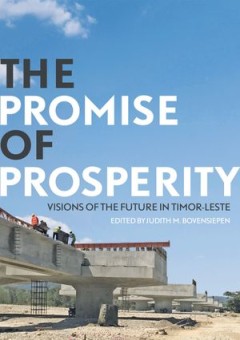
The Promise of Prosperity: Visions of the Future in Timor-Leste
For the people of Timor-Leste, independence promised a fundamental transformation from foreign occupation to self-rule, from brutality to respect for basic rights, and from poverty to prosperity. In the eyes of the country’s political leaders, revenue from the country’s oil and gas reserves is the means by which that transformation could be effected. Over the past decade, they have formulat…
- Edition
- -
- ISBN/ISSN
- 9781760462529
- Collation
- -
- Series Title
- -
- Call Number
- 301 PRO p
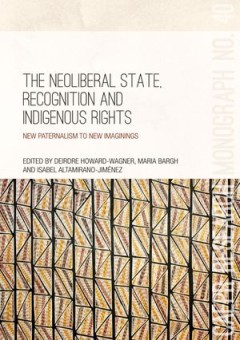
The Neoliberal State, Recognition and Indigenous Rights: New paternalism to n…
The impact of neoliberal governance on indigenous peoples in liberal settler states may be both enabling and constraining. This book is distinctive in drawing comparisons between three such states—Australia, Canada and New Zealand. In a series of empirically grounded, interpretive micro-studies, it draws out a shared policy coherence, but also exposes idiosyncrasies in the operational dynamic…
- Edition
- -
- ISBN/ISSN
- -
- Collation
- -
- Series Title
- -
- Call Number
- 994 NEO n
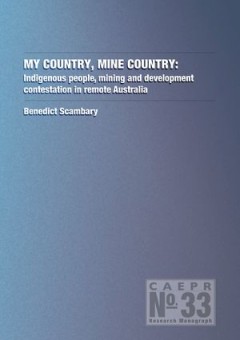
My Country, Mine Country: Indigenous people, mining and development contestat…
Agreements between the mining industry and Indigenous people are not creating sustainable economic futures for Indigenous people, and this demands consideration of alternate forms of economic engagement in order to realise such ‘futures’. Within the context of three mining agreements in north Australia this study considers Indigenous livelihood aspirations and their intersection with sustai…
- Edition
- -
- ISBN/ISSN
- 9781922144720
- Collation
- -
- Series Title
- -
- Call Number
- 340.115 SCA m

Making Change Happen: Black and White Activists talk to Kevin Cook about Abor…
This book is a unique window into a dynamic time in the politics and history of Australia. The two decades from 1970 to the Bicentennial in 1988 saw the emergence of a new landscape in Australian Indigenous politics. There were struggles, triumphs and defeats around land rights, community control of organisations, national coalitions and the international movement for Indigenous rights. The cha…
- Edition
- -
- ISBN/ISSN
- 9781921666728
- Collation
- -
- Series Title
- -
- Call Number
- 920 GOO m

Indian Water in the New West
Brings together the views of engineers, lawyers, ecologists, economists, professional mediators, federal officials, an anthropologist, and a Native American tribal leader--all either students of these processes or protagonists in them--to discuss how the legitimate claims of both Indians and non-Indians to scarce water in the West are being settled.
- Edition
- -
- ISBN/ISSN
- -
- Collation
- -
- Series Title
- -
- Call Number
- -
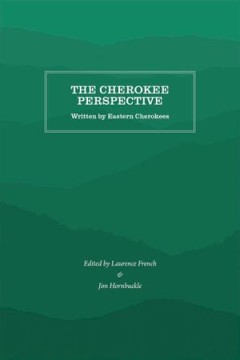
The Cherokee Perspective Written by Eastern Cherokees
In 1973, Cherokee students at the Qualla Boundary started a student organization with the intention of improving the educational prospects among Native Americans attending non-Indian colleges and universities. Under the direction of Laurence French and Charles Jim Hornbuckle, the students interviewed Cherokee elders and received help from the American Indian Historical Society in order to gain …
- Edition
- -
- ISBN/ISSN
- 9781469638515
- Collation
- -
- Series Title
- -
- Call Number
- -

In Defense of La Raza The Los Angeles Mexican Consulate and the Mexican Comm…
Mexican communities in the United States faced more than unemployment during the Great Depression. Discrimination against Mexican nationals and similar prejudices against Mexican Americans led the communities to seek help from Mexican consulates, which in most cases rose to their defense. Los Angeles’s consulate was confronted with the country’s largest concentration of Mexican Americans, f…
- Edition
- -
- ISBN/ISSN
- -
- Collation
- -
- Series Title
- -
- Call Number
- -

The Cherokee Perspective: Written by Eastern Cherokees
In 1973, Cherokee students at the Qualla Boundary started a student organization with the intention of improving the educational prospects among Native Americans attending non-Indian colleges and universities. Under the direction of Laurence French and Charles Jim Hornbuckle, the students interviewed Cherokee elders and received help from the American Indian Historical Society in order to gain …
- Edition
- -
- ISBN/ISSN
- 9781469638515
- Collation
- -
- Series Title
- -
- Call Number
- 302 FRE c
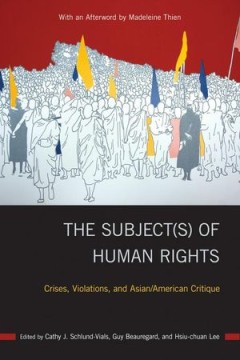
The Subject(s) of Human Rights: Crises, Violations, and Asian/American Critiqu
The field of Asian American studies grew out of mid-twentieth century civil rights struggles, anti-war protests, and third world liberation movements. As a result, human rights issues have always been part of Asian American studies, though they've been largely peripheral to the interdiscipline. This edited collection bring Asian American studies to the center of human rights critique by engagin…
- Edition
- -
- ISBN/ISSN
- 9781439915721
- Collation
- -
- Series Title
- -
- Call Number
- 301 SUB s
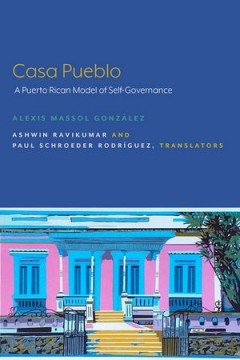
Casa Pueblo A Puerto Rican Model of Self-Governance
- Edition
- -
- ISBN/ISSN
- 9781643150291
- Collation
- -
- Series Title
- -
- Call Number
- -
 Computer Science, Information & General Works
Computer Science, Information & General Works  Philosophy & Psychology
Philosophy & Psychology  Religion
Religion  Social Sciences
Social Sciences  Language
Language  Pure Science
Pure Science  Applied Sciences
Applied Sciences  Art & Recreation
Art & Recreation  Literature
Literature  History & Geography
History & Geography